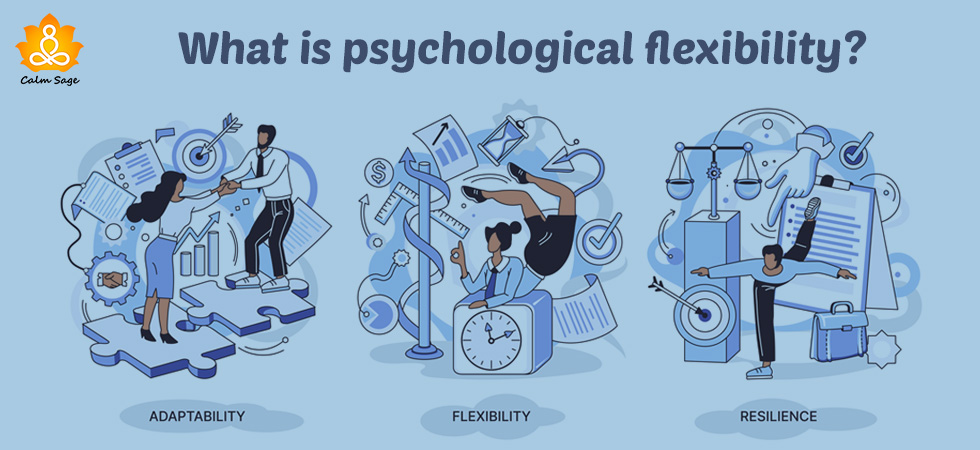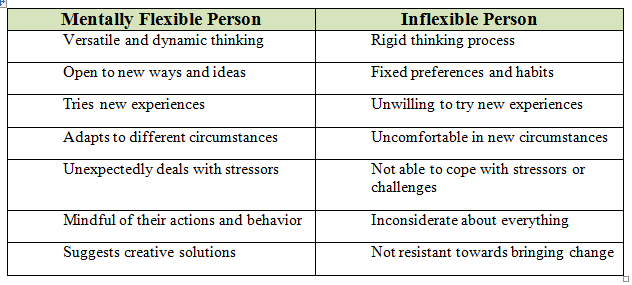What Is Psychological Flexibility? 6 Ways To Increase It

Psychological flexibility or Mental Flexibility is not an unknown concept. There are so many therapies in which the patient is taught psychological flexibility so that their ability to face challenges that life throws at them is increased.
Someone wise said, “Anyone who wants to grow mentally, physically, or spiritually must know that growth is not found in comfort.” Therefore, sometimes we have to change our preferences, rigid thinking, or choices to achieve the growth we wish to achieve.
Improving our mental flexibility can help us achieve things we wish or aim for. Mental flexibility is not gifted or passed, but it is created with time, experiences, perspectives, and more. If you’re looking forward to achieving something in your life, you must prepare yourself to be flexible.
We all have been in a situation when life was just so uncertain and unpredictable. Do you remember how you reacted in those tough situations? The reaction we have when life challenges us tells a lot about our psychological flexibility.
In this blog, we will be discussing mental flexibility, traits of flexible people, and how to become flexible.
What Is Psychological or Mental Flexibility?
Psychological flexibility basically means being able to be in the present moment and adapting well to a stressful/challenging situation. It basically is the ability to view the current problem in the current time in a holistic way.
Psychological flexibility also means that you are not stuck at only one rigid way of thinking. You are flexible enough to change your approach according to the situation. You do not react to the influence of your emotions, your reactions and decisions are influenced by your value system.
When you are psychologically flexible you do things the right way and do not choose a comfortable way out of the situation.
Here’s a list of things that indicate psychological flexibility in an individual…
- Awareness about what’s important right now and what’s not
- Identifying harmful reactions/behaviors and amending them
- Changing perception when found incorrect
- Balancing life by balancing all aspects of life
- Focused on your goal even after multiple failures
- Does not compromises their value system
- Finds creative solutions to problems/challenges in life
To cut the long story short, Psychological flexibility is a condition of all the above-mentioned attributes in an individual.
Traits of Mentally Flexible People
Flexible people are easily adjustable, versatile, and dynamic thinkers. They know how to get things done. Below are some of the common traits of flexible people or people who have excelled the art of mental flexibility:
- Versatile and dynamic thinking
- Open to listening new and adapting to new ideas or strategies
- Willing to try new things and take new challenges
- Easily adapt to new and different situations
- Easily deals with unexpected stressors of life
- Puts or suggests creative ideas
- Mindful of others thoughts and feelings
Difference between Psychological Flexible and Inflexible Person:

Benefits of Being Flexible:
Mental flexibility is a trait which is developed with time and experiencing different situations. This trait keeps on polishing with time and it makes people vulnerable to handling or managing challenging situations. Moreover, it also helps in being open-minded at work and to excavate creative ideas. This helps in dealing with unexpected stressors of life.
Being flexible makes us less conflicted or frustrated about our lives and it can help in reducing the symptoms of mental health issues like stress, anxiety, and depression.
It also helps in being open to enjoying new and different experiences which are very helpful while attending social occasions and while traveling. Mental flexibility helps in developing better and more successful relationships.
What Does The Psychological Flexibility ACT Model State?

ACT, Acceptance and commitment therapy, uses Psychological flexibility as its base. This talk therapy’s main aim is to develop psychological flexibility and has explained the Psychological flexibility model very well.
Psychological flexibility model states that there are three pillars of psychological flexibility which help us become extremely adaptive and resilient to any challenge that is thrown at us. These three pillars are
- Be Present
- Be Open
- Do what really matters
Now the question here is how can someone develop these three essential pillars? Well, the model has an answer for that too.
According to the model, there are six different tools with help of which anyone can develop and strengthen the pillars of psychological flexibility.
The six tools are as follows:
- Acceptance
- Values
- Defusion
- Be aware of the present
- Committed action
- Self as context
Also read: What is Act Therapy and How Does It Work?
But How should you use these tools? It’s simple, add them as the principles which you follow in your day-to-day life. Still confused? Let me help you with that…
6 Best Ways To Increase Psychological Flexibility
Since Psychological flexibility is a fundamental aspect of our mental health, it’s important for us to either increase it (if declined) or at least keep it maintained. Here’s how you can do that…
1. Acceptance
Now, here you have to note that with Psychological Flexibility you will require active acceptance much more than a passive one. You should have an acceptance to each experience that you have in every moment in the present.
2. Defusion
Diffusion basically means that you are not your thoughts. Our thoughts are a part of us, it doesn’t define who we are as a person. For Psychological Flexibility you need to separate yourself from your thoughts. For example, if you feel sad, rather than thinking you are a sad person, think like you are a person who is sad at the moment.
3. Be Aware of the Present Moment
Being in the present moment, observing and acknowledging each thought, feeling, sensation, action and your surroundings. Know what you might be feeling and what is causing that and what the right way of reacting to it is.
4. Values
We need to get our value system straight. Know what matters to you and what doesn’t. Recognize your values because this makes life very simple. You will know exactly what to do because you will be guided by your values.
5. Be Creative
Creativity can help us in a lot of ways. Increasing our creativity level, we can come up with good creative ideas to solve a problem. You can also practice out of the box thinking and challenges become easier to face.
6. Don’t Rely On Assumptions
Assuming things are as it is not a good idea because in most cases things are not how they seem to be. Therefore reacting because of mere assumptions is not right, always get your facts right and then react.
I hope this blog helps you become more flexible and dynamic by boosting your mental flexibility skills. Always remember, you must keep on trying new things, look forward to more opportunities, and seek learning from your perspectives and experiences.
Being flexible will not only help you in achieving growth but also help in thinking more creatively and promote healthy and better relationships.
Comment down and share “what makes you more flexible.” For more such content, connect with us on all social media platforms.
Thanks for reading!




















